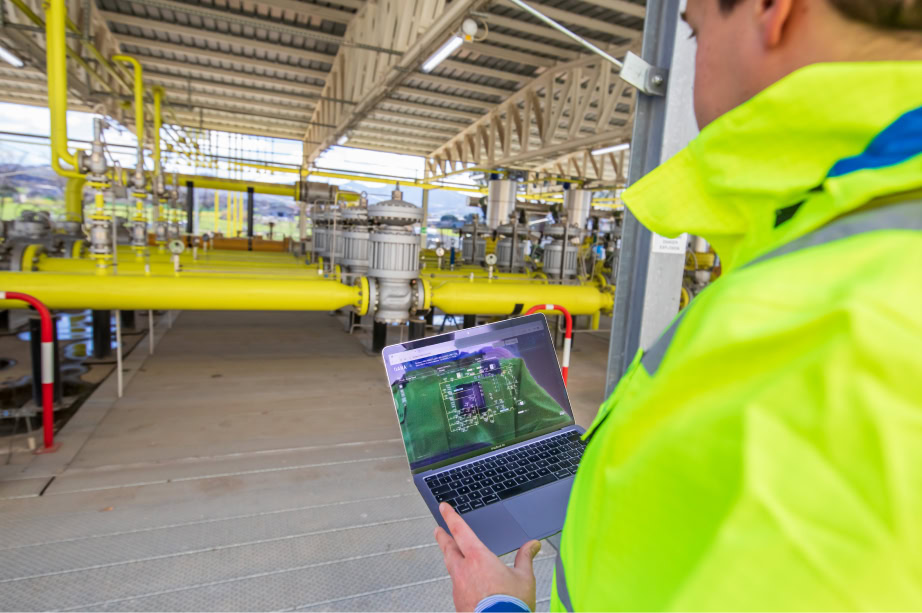
Smart gas grids
Digitalization as a crucial step to accelerate the distribution of renewable gas and reduce the carbon footprint.
Digitisation and innovation of networks
We want to convert distribution networks into smart grids through digitization and the application of innovative technologies to increase safety, operational efficiency and to enable the use of renewable, synthetic and hydrogen gases.
A smart network
The digital transformation of networks allows the creation of a smart, digital and flexible network ready to receive diversified gases such as biomethane, hydrogen and synthetic methane. Integrated sensors allow real-time analysis of the resource and become discriminating for whether or not it is placed on the network. We started the digital transformation of assets, processes and people as early as 2017 and continue to invest to become the world’s first gas utility with a fully digitised network.
Digitalization of networks: the advantages
Sustainibility
- Efficient distribution of renewable gasses
- Reduction of the environmental impact and escaping emissions
- Decarbonization support and EU ‘s climate objectives
Security and resilience
- Early detection of anomalies
- Adaptation to the impacts of climate changes
- Quick response to extreme climate events
- Quick remote intervention
New business opportunities
- Technology developed for gas is changed and adapted to the water sector
- Improved service efficiency
- Water leak detection and prevention
- Water infrastructure modernization
Advanced operational efficiency and maintenance
- 24/7 remote monitoring and control via DANA
- Predictive maintenance to anticipate malfunctions
- Optimization of gas flows and leaks reduction
- Reduction of downtime and operating costs
Monitoring and maintenance
- Improvement of service and innovation
- More accurate data on consumption and precise billing
- Real-time analysis of gas quality
- Network adaptability to new technologies
- Support for the evolution of the energy sector

Digital transformation and renewable gases
The European Union aims to achieve climate neutrality by 2050 and reduce greenhouse gas emissions by 55% by 2030 through the energy transition, shifting to renewable and low-emission energy sources. A fundamental prerequisite for fostering the development of renewable gases is the digital transformation of networks, enabling the creation of a smart, digital, and flexible network ready to accommodate and manage diverse gases such as biomethane, hydrogen, and synthetic methane. In fact, integrated sensors allow realtime analysis of the resource and they become the determining factor for whether or not the resource is injected into the network. Since 2017, Italgas has been leading this digital transformation of assets, processes, and people, aiming to become the first gas utility with a fully digitized network.
Strategic Plan 2024-2030: the main investments
€15.6 billion are the expected investments over the plan period. The largest share once again allocated to the development, digitization, and repurposing of the gas distribution network in both Italy and Greece.
-
12.8 € billion
for the Italian gas distribution network
-
of which 2.7 € billion
are dedicated to digitization
-
of which 140 € million
allocated for completing the process of methanization of Sardinia
-
1 € billion
for the development of the gas distribution network in Greece

Digitising networks: smart solutions
The digital transformation in Italy aims to collect information, enable remote control, manage renewable gases and develop predictive maintenance programs. Some portions of the network are already fully digitized and managed remotely. GRFs (Final Reduction Groups) are being replaced and solenoid valves, sensors, actuators and gas chromatographs are being installed, in addition to replacing GPRS-based smart meters with NB-IoT ones.

Sardinia: the network of the future
Since 2017 we have been at the forefront of the methanation of Sardinia. The new Strategic Plan envisages 140 million euros of investment for the construction of the last “native digital” networks and conversion to natural gas of the networks in the cities of Cagliari, Sassari, Oristano, and Nuoro, currently powered by propane air.

Greece: investments on the digitalization
In Greece, through its subsidiary Enaon, investments of €1 billion (an increase of €100 million compared to the previous Plan) are planned for the extension of the network and its digital transformation, thereby facilitating the penetration of natural gas into areas not yet served and enabling the distribution of renewable gases.
See also
-
Our path
-
Water networks
-
Security
-
Digital Factory




